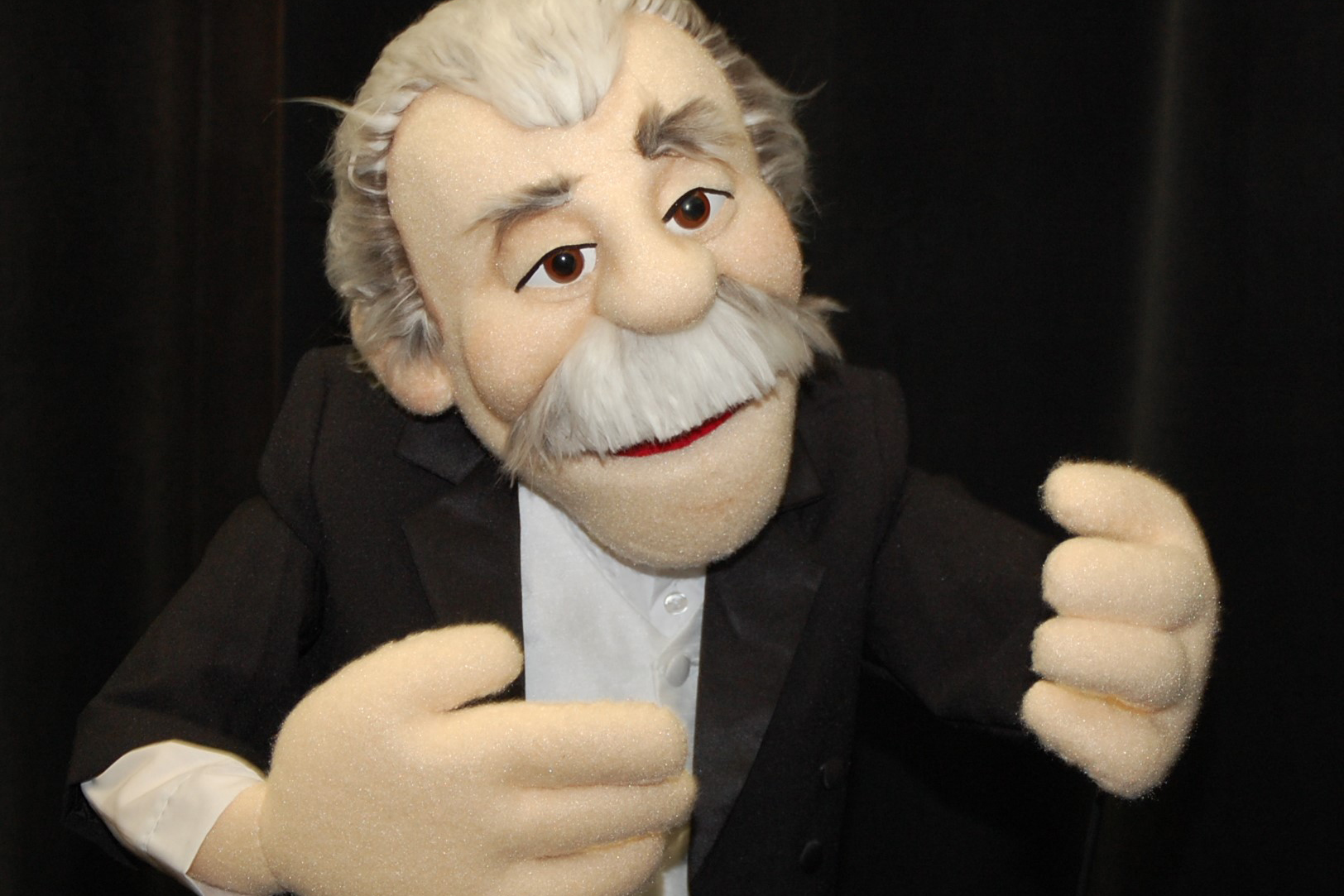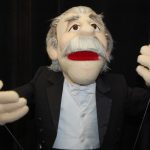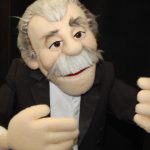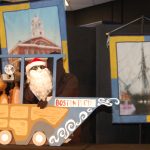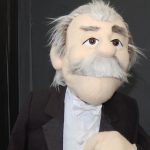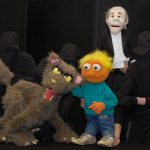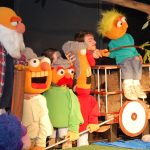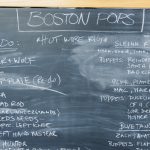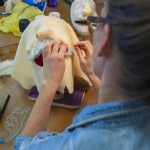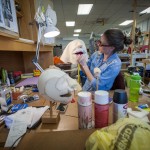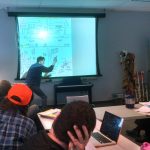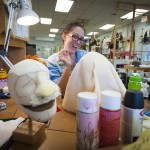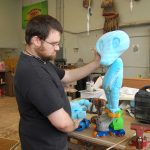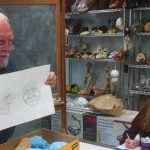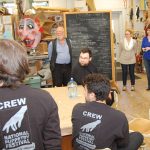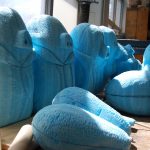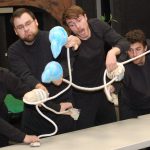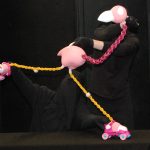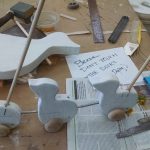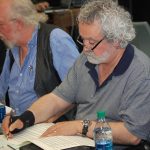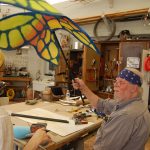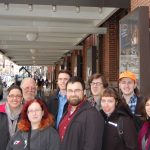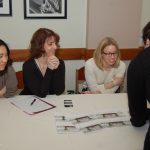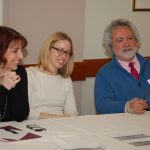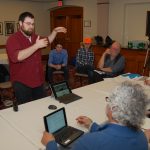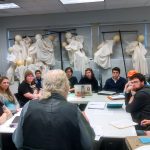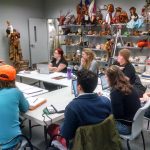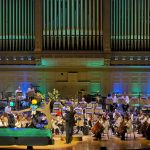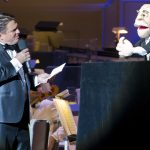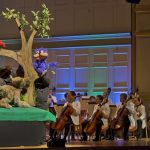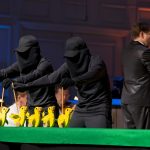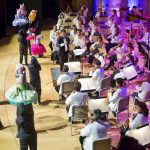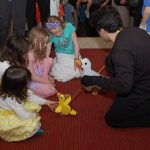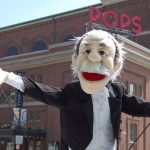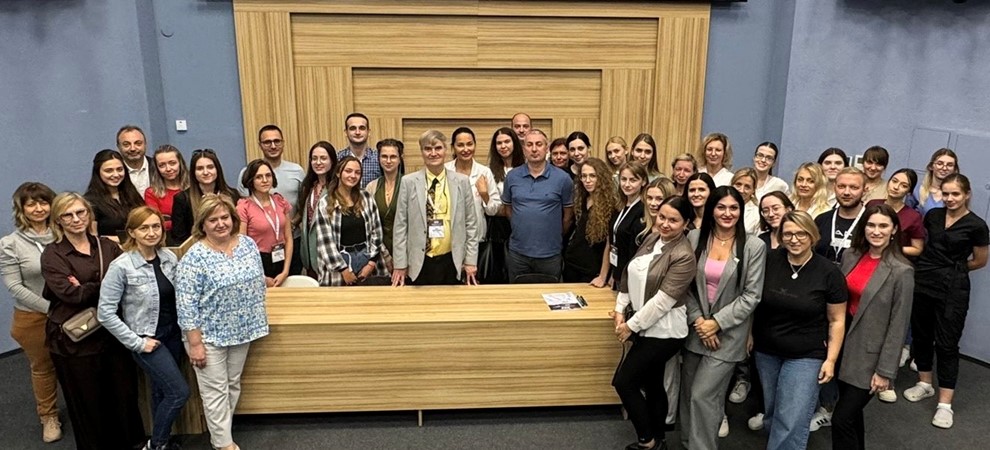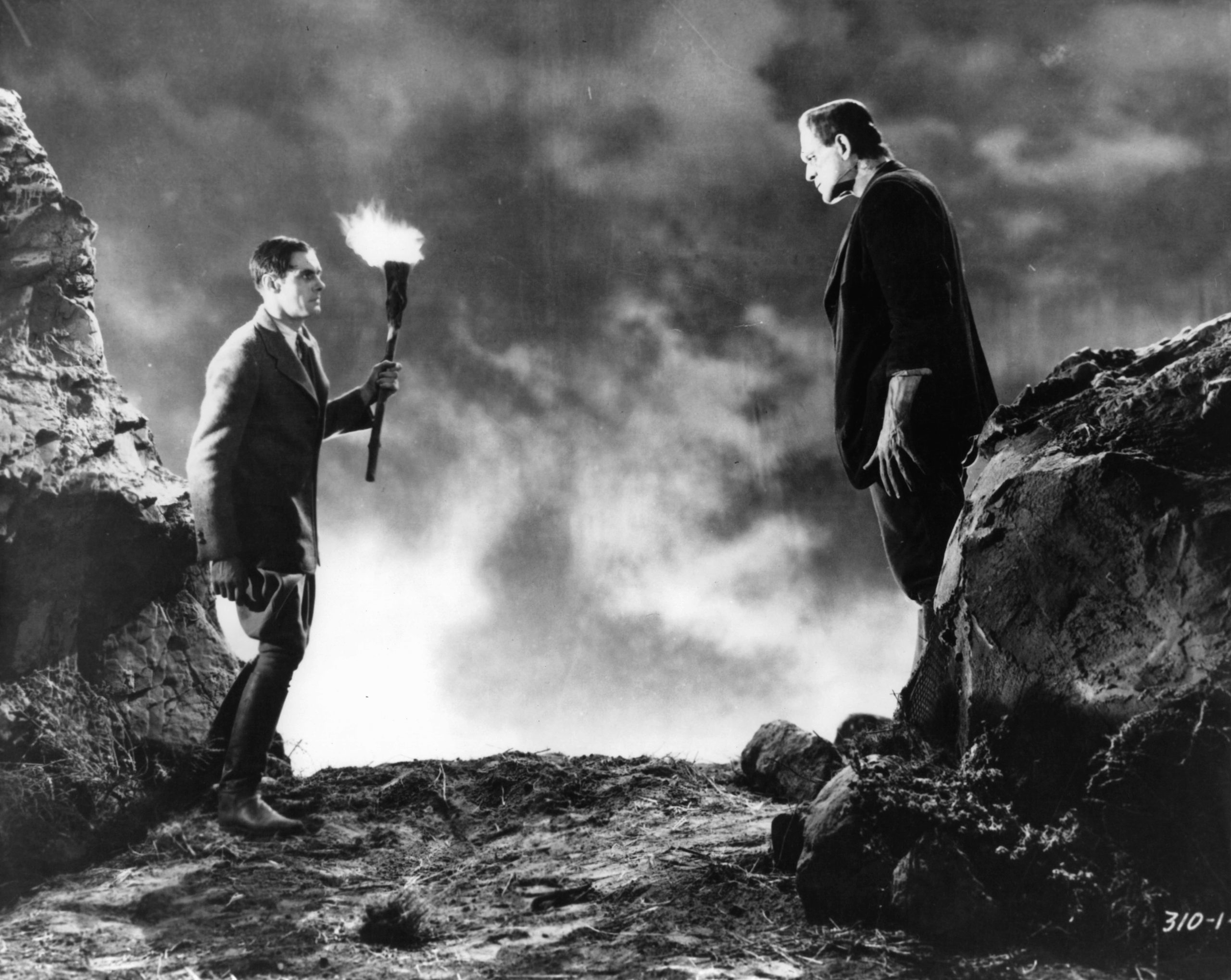Students from UConn’s internationally renowned Puppet Arts Program created original works and built 40 puppets to perform with the Boston Pops Orchestra, featuring a puppet of legendary conductor Arthur Fielder.
When Boston Pops conductor Keith Lockhart raises his baton on Saturday to begin the “Puppets Take the Pops” program at Symphony Hall in Boston, the performance will mark the culmination of nearly five months of developing a series of original puppet vignettes created by a class of UConn students.
The students participated in a special class this past spring semester led by Bart Roccoberton Jr., head of the Puppet Arts Program, which developed six vignettes inspired by the music of Leroy Anderson, the iconic American arranger and composer (“Sleigh Ride,” “The Syncopated Clock,” “The Typewriter”). Anderson lived in Woodbury, Conn., and was a longtime collaborator with the legendary Pops conductor, the late Arthur Fiedler.
“We are always looking for new collaborators and inspiration, and creative partners that will really enhance the music by adding some sort of visual element that is not normally there,” Lockhart says. “We really wanted something to mark this collaboration that was new, that we had created. We gave them a lot of Leroy Anderson to listen to. He was kind of the poet laureate of the Boston Pops. We have been adding greater emphasis to our family matinees during the Pops season. It’s going to be wonderful for our audiences, and a great experience for the students involved. My only regret is that since I have to conduct it and will be behind the puppets, I have the worst seat in the house.”
“Puppets Take the Pops” will be performed at 3 and 8 p.m. on Saturday, May 21, and again on May 24 at 8 p.m. as part of “Arthur Fiedler Night /Harvard 50th Reunion Night.” When he was a Harvard graduate student, Anderson served as director of the Harvard University Band.
In addition to the Anderson compositions, the program will begin with the UConn puppeteers performing “Peter and the Wolf,” the children’s story composed in 1936 by Sergei Prokofiev that is narrated to the accompaniment of an orchestra. The narrator will be a puppet of Arthur Fielder commissioned by the Boston Pops and created by Roccoberton and Sarah Nolen ’15 MFA. Kalob Martinez ’16 MFA will give voice to the Fiedler puppet.
The collaboration between Boston Pops, known as “America’s Orchestra,” and UConn’s renowned Puppet Arts Program, was initiated two years ago during the orchestra’s annual holiday performance at Jorgensen Center for the Performing Arts. One of the highlights of the Pops’ holiday tour is a reading of Clark Clement Moore’s poem “The Night Before Christmas,” narrated by a prominent person in the community. In 2014, Roccoberton was invited to do the reading but said he had another idea – a puppet could read the poem.
Nolen had recently created video for a social media campaign for UConn in which a puppet that she designed and built, Skip Toumalou, decided to photobomb student selfies to add friends to her new Facebook account. Roccoberton asked Nolen if she could develop a voice for the puppet for the Pops performance and she did. A video of Skip narrating the poem was sent to Boston.
“We realized we were dealing with someone at a very high professional level,” Lockhart says. “I’ve been doing holiday concerts with the Pops for 21 years. It was one of the very best – if not the very best – narrations we’ve had with the orchestra. I met with Bart and said we really have to bring you to Boston to do something.”
Roccoberton and the Pops artistic planning staff soon began a series of discussions in Boston about developing an original performance using puppets. By late 2015, they decided to focus on Anderson’s orchestral miniatures along with “Peter and the Wolf,” which UConn puppetry students had performed over the years with the Hartford Symphony and other orchestras in Connecticut. Roccoberton discussed the class and the unique opportunity it would provide with students as they were registering for Spring 2016 courses. Those who registered for the class received a compact disc with 24 Anderson compositions to listen to by the time they would return to campus in January.
On Jan. 21, 10 undergraduate and graduate students sat around a rectangular grouping of tables in the Puppet Arts building on UConn’s Depot Campus for the first meeting of Dramatic Arts 5697, surrounded by shelves holding a variety of puppets designed and built by prior students. Sitting before his students, Roccoberton noted the course syllabus he had distributed to the class – an ambitious schedule to create, design, build, and rehearse several original puppet performances.
The class, he noted, would serve as the production phase for the performance. At the completion of the class, auditions would be held for any puppetry student to perform. A Dean’s Grant and additional funding from the Boston Pops would pay for materials and other expenses for set design and building puppets.
“This is going to be a very different class than what you’ve experienced,” Roccoberton said. “The things I’m going to ask you to bring here are creativity, effort, and passion. We are working on a major project. We are going to work with an orchestra known as America’s Orchestra, the Boston Pops, at their invitation. We have a big, big challenge ahead of us. They see it in us. I see it within us. We’re starting this class with absolutely nothing to touch. We are going to work very hard. I hope in this hard work we’re going to find exciting things.”
Three weeks later the students presented their ideas for 24 Anderson compositions, each between two and three minutes in length. Each student had selected several compositions to work with for a storyboard, a series of drawings that tell a story in sequence much like a comic book to visualize a creative concept. Some storyboards were simple stick figure drawings. Others were more elaborately drawn. Many of the vignettes were populated by animals – a raccoon skating on an ice pond with flamingos. ducks jumping in and out of a pond, turtles and fish competing for food in a fish tank, and a cat chasing a mouse. Roccoberton and the students questioned each presenter, offering suggestions based on their answers: What kind of puppet style will you use? Where will the characters go? Will the puppeteers be seen? What kind of materials will you use to build the puppet? How big will the puppet be?
After making the difficult decisions as to which of the Anderson compositions to present to the Pops artistic planning staff, seven students in the class traveled to Symphony Hall in Boston on Feb. 22 with Roccoberton and Elizabeth Acosta, administrative coordinator for Puppet Arts, to present 10 storyboards to consider for the May performance. The Pops artistic staff – Dennis Alves, director of artistic planning; Amanda Severin, manager of artistic planning and services; Leah Monder, production manager; and Wei Jing Saw, assistant manager of artistic administration – smiled often at the whimsical scenarios presented for the compositions, and raised questions about resetting scenery between the vignettes, for example, and the ability of the audience to see the puppets from different parts of the venue.
Returning to Storrs, the class began creating more detailed designs for the storyboards they had presented. Over the next few weeks, Roccoberton, Alves, and Severin talked regularly over the phone and agreed to focus on seven scenarios, with the understanding they would likely produce five or six.
“Right now the creator is losing ownership of the piece,” Roccoberton said, as UConn’s Spring Break approached in March. “We’re looking for that thing we can share through the entire piece that gives the overall concept and is probably going to be designed by someone other than the creator. Now I have to think practically as a director. How many people will it take to pull off this one thing? The class is very much about this project, but the students also have to leave here with something they’re going to use in future productions.”
As the spring semester moved toward its conclusion in early May, the class spent much of its time in the workshop area of the Puppet Arts building. Hand tools were used to begin sculpting puppet heads, hinge legs and arms, and create scenery for sets that would be needed for the performance. Auditions were held for puppeteers who would perform on stage, and they began rehearsals. Four class members who were not performing worked on the production of sets and puppets.
“I’ve never done anything on this scale,” said John Cody ’17 (SFA), whose concept for “Penny Whistle” will be performed. “This is taking everything we’ve learned in the other classes and expanding upon it. I’m going to do my senior project next year. To have this experience is great, because you get to see what works in creating a show, what might not work, how to plan it out, and how to really crank out a big endeavor in a fairly short amount of time. It’s pretty wild to come in at the start of the semester with those inklings in the music and build dozens of puppets. It’s pretty crazy for us, with finals and having to get this done. But it’s fun.”
On Saturday, April 30, while the UConn campus was being prepared for its Commencement ceremonies on Mother’s Day weekend, Alves, Severin, and Monder arrived from Boston to see rehearsals of the performance at the Puppet Arts building. Alves, a trumpeter, made notes on the musical scores for each composition, as the student puppeteers danced through the choreography of each piece. Monder also made notations, and Severin took photos with her phone.
“One of the things I’m really impressed with is how seriously [the UConn group] took the concerns we expressed before, and they’ve made changes that alleviate them completely,” said Monder.
In addition to narrating “Peter and the Wolf,” the puppet of Arthur Fiedler will appear in some of the Anderson vignettes. Roccoberton designed the puppet, and Nolen offered suggestions as she began to build it.
“We talked about what are Mr. Fiedler’s outstanding features,” Nolen said. “The receding hairline, sideburns, longer hair in the back, and the moustache, which is probably the most important. We accentuated features, but we didn’t take them to an extreme.”
Avles says the Fiedler family is looking forward to seeing the puppet of the longtime Pops conductor: “I spoke to Peter Fiedler, Arthur’s son. He’s excited about the whole thing. He’ll be here for the performance.”
Cast Members
Mark Blashford, graduate student, second year MFA, Carlisle, Pa.
Zach Broome, graduate student, first year MA, Puppet Arts, Macon, Ga.
Mac Cherny, undergraduate, senior BA, Theater Studies, West Hartford. Conn.
Ana Maria Craciun, graduate student, third year MFA, Budapest, Romania
Isinsu Ersan, Ph.D., Fulbright Visiting Student Researcher, Theater, Izmir, Turkey
Anatar Marmol-Gagne, graduate student, third year MFA, Caracas, Venezuela
Kalob Martinez, graduate student, third year MFA, Amarillo, Texas
Shane McNeal, graduate student, second year MFA, Bristol, Conn.
Christopher Mullens, graduate student, third year MFA, Lewisburg, W. Va.
Nicholas Parks, undergraduate, third year BFA, Puppet Arts, Bellflower, Calif.
Michael Rogers, undergraduate, second year BFA, Puppet Arts, San Luis Obispo, Calif.
Krista Weltner, graduate student, third year MFA, Dayton, Ohio
Production Class Members
Katayoun Amir-Aslani, undergraduate, third year BFA, Puppet Arts, New Canaan, Conn.
John Cody, undergraduate, third year BFA, Katonah, N.Y.
Cori Leyden-Sussler, graduate student, first year MA, Glastonbury, Conn.
Kelly Vickers, undergraduate, second year BFA, Puppet Arts, Scituate, Mass.
